Baptist Union Council: March 2024
Baptist Union Council took place 19-20 March at the Hayes Conference Centre in Swanwick, Derbyshire
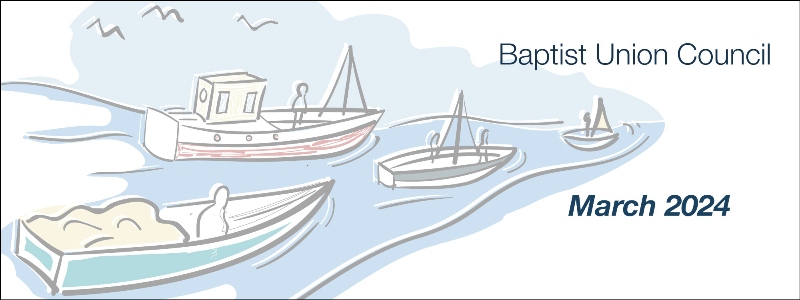
Scroll down for the following:
-
Introduction and reflection
-
Marriage and Ministry
-
Finance update
-
Financial Model Review
-
Pensions
-
Ministerial Recognition Rules – notice of probable update
-
New member churches, church closures, amalgamations and more
-
Presidency 2025-2026
-
Key Roles Nominations
-
Worship and Mission Forum films
-
Closing remarks
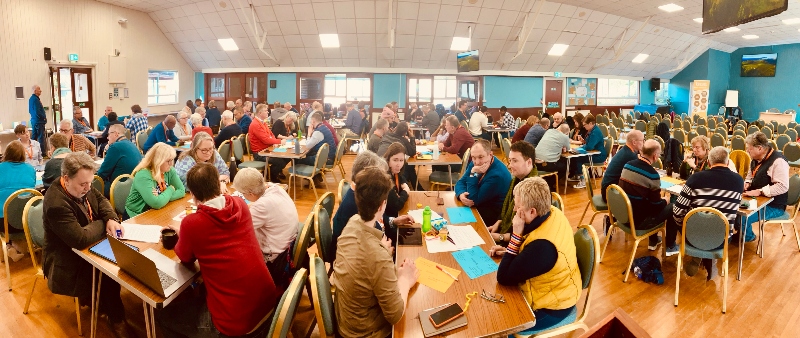
Introduction and reflection
Most of the March 2024 Council was devoted to answering the question regarding Ministry and Marriage as defined in the Ministerial Recognition (MR) rules.
On Wednesday morning Council voted not to change the MR rules with 49 favouring no change (64 per cent); 27 advocating a change (35 per cent) and one abstention. A two thirds majority was required in favour of the change for it to happen.
Members subsequently agreed the following statement. The decision and the statement were shared with all who had been invited to participate in the Ministerial Rules Consultation at 6pm on Wednesday (20 March), alongside a video message from General Secretary Lynn Green.
In her introduction Lynn reminded Council of the purpose and charitable objects of our Union and noted Council’s role as a place where the full diversity of the Union can and should be represented.
Commenting after the meeting Lynn shared, 'I was pleased that the final vote so accurately reflected the views expressed in the Consultation report with 64 per cent voting for no change, and 35 per cent expressing a desire for the MR Rules to allow for the convictions of all around marriage to be respected and held in tension as a reflection of our Baptist ecclesiology.
'I was also struck by how our Council is beautifully representative of all parts of our family, not only through formal representation, but also through co-options and all the connections that Council members have with the many informal groupings across Baptists Together.'
Marriage and Ministry
Worship, prayer, scripture, discussions around tables and in plenary all featured in the lead up to the vote, which was conducted by secret ballot. Council members had been given access to the Consultation Report in February, while responses and reflections gathered by the independent Consultation Team at the 2023 Baptist Assembly were displayed in various parts of the room.

Tuesday morning’s worship was led by Nigel Manges (South West Baptist Association SWBA), who shared with members how we are called to be clothed with the fruit of the Spirit. (Gal 5: 22-23). Everyone received a bookmark highlighting the words in this verse.
Lynn then set the scene, explaining the journey so far. In November 2020 we received a request from 70 people who are part of Baptists Together (mainly ministers but some church members) to change the ministerial rules to make it possible for ministers to be in a legal Same Sex Marriage and be accredited.
This request went to our Ministerial Recognition Committee, which subsequently referred it to Council as the body which exercises spiritual and strategic oversight of the affairs of the Union. Council first discussed the question in March 2022, with further updates in October 2022, March 2023 and October 2023. Council in due course agreed to conduct a national consultation, which was open between May and November 2023. The consultation report is here.
A detailed report, it showed a range of opinion across our Union.
Ninety-three per cent of accredited ministers responded, alongside 52 per cent of churches, four colleges and 11 Associations.
From the churches who responded:
-
56 per cent of churches said that an accredited minister could not be in a same-sex marriage.
-
8 per cent said that accredited ministers could be in a same-sex marriage.
From those who responded to the ministers’ survey:
-
57 per cent said that an accredited minister could not be in a same-sex marriage.
-
25 per cent believed accredited ministers could be in a same-sex marriage.
The executive summary highlighted how the consultation team had also been ‘very struck’ by the number of neutral responses, sometimes as many as 40 per cent. There was a variety of reasons – ‘maybe some don’t know what to say, maybe some are still thinking things through, maybe some are trying to hold a middle space, maybe some are living with a diversity of views in their context.’ In addition to the headline figures, it was ‘important to notice this silence’, the summary stated.
Lynn told Council members the report was one of the discernment resources at their disposal. She highlighted worship, scripture and prayer; the wisdom and insight from Council members’ context of church, Association, College or Specialist Teams, and being attentive to the Holy Spirit.
She also highlighted I Corinthians 12:20-27, which shows the body of Christ has many parts and that we should have equal concern for each other. With this in mind she introduced the Five Voices* approach to enable Council members to reflect with each other and ensure all voices could be heard.
(*5 Voices, how to communicate with everyone you lead by Jeremie Kubicek & Steve Cockram.)
Lynn invited Council members onto tables to explore a range of questions and different viewpoints. Members spent an hour and a half reflecting on these questions. They were encouraged to write their answers on paper, which were subsequently displayed on boards around the room to be reflected on by all present. They were also given the opportunity to write down specific points, which would be read out at the start of Wednesday’s session.
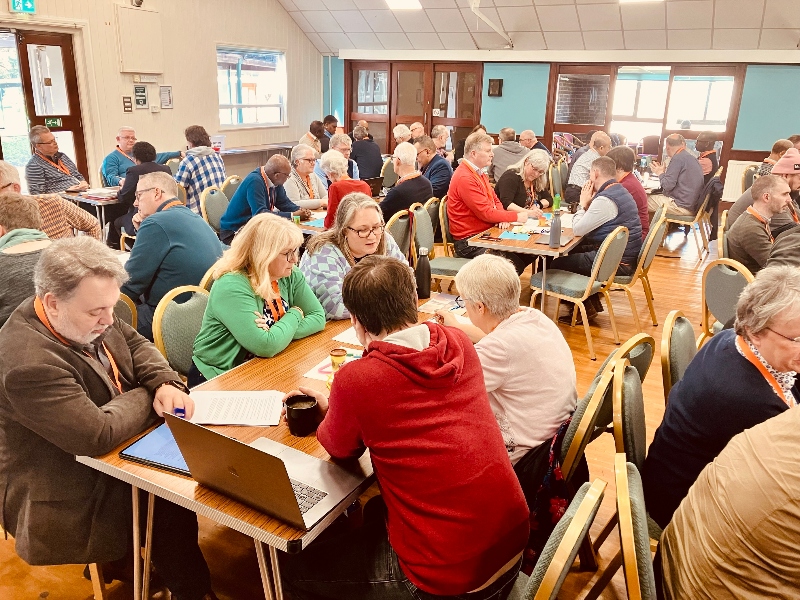
Wednesday began with Council members sharing the peace and then communion, which was led by Carl Smethurst (SWBA).
A plenary session followed, in which Council members were able to share their thoughts with the whole room. As with the responses to the questions the previous day, a range of thoughts and emotions were shared.
The hurt of the LGBTQ+ ministers who spoke at Council two years ago was highlighted, and a poem was shared, written by someone from the LGBTQ+ community to capture how they feel unsafe in church. One member highlighted agency: if the words remain, there is no agency left for those of an affirming position - but if words are removed, there is full agency for all. One member acknowledged the fear of an unknown future should the change be made - but spoke of what LGBTQ+ people are already bringing, saying 'There's joy there.'
While these were ‘really moving conversations’, noted another, the consultation survey from churches was 'clear': it was ‘crucial’ for Council to reflect its findings. Others spoke of the anguish they and other churches felt from holding an orthodox position and being caricatured as ‘homophobic bigots’.
The possibility of a creative third way was mooted, though one member felt this hadn’t been given the opportunity to be fully explored because of the polarising battle lines. A suggestion to split was aired – unions with different accreditation rules but some shared resource – though several spoke of the strengths of walking together and watching over each other in our differences, particularly in an increasingly polarised world. In this way Baptist ecclesiology and the autonomy of the local church were frequently referenced, with their capacity to allow for diversity. Several highlighted the potential for division, whatever the outcome of the vote; of their tiredness, even of feeling ‘physically sick’.
One member felt we still hadn’t been able to capture the views of those in the middle, and that churches continued to journey with this.
Prior to the vote, Nigel Manges thanked members for upholding his call at the start of the previous day to be clothed with the fruit of the spirit. ‘Thank you for way you’ve been able to share,’ he said.
Following the vote several members highlighted their concern for the Baptist LGBTQ+ community who would be directly affected by Council’s decision, and wanted the statement to reflect this.
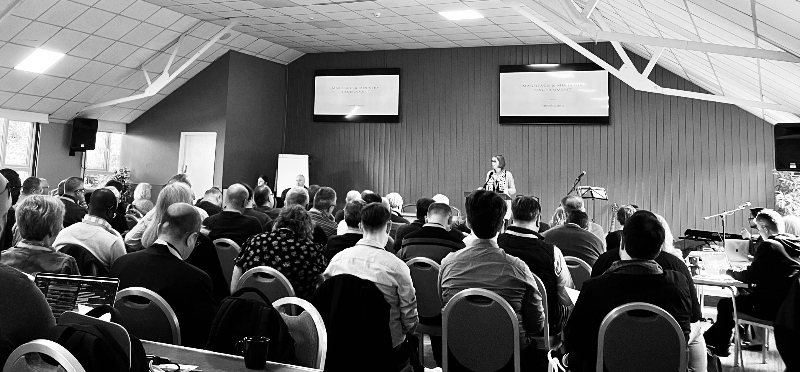
Lynn echoed both of these points in in her video message later that day:
‘Our meeting together has been bathed in worship and prayer,’ she said, ‘and whilst we've had some really honest conversations these were all shared with gentleness and grace.
'However you feel about the decision that has been made, please do remember that this affects real people's lives and these individuals are our Brothers and Sisters in Christ.
'I can assure you that Council laments all the pain that has been experienced through the process which has led to this decision and is acutely aware of the significant impact it may have.
'While they have reached the decision Council recognises that the Consultation Report reflects a range of convictions across our Baptist family. Council is asking us all to demonstrate grace and respect towards those that hold different views to their own.
'Council is also asking us all to exercise pastoral care and sensitivity, especially to those who requested this change or who are unable to be in accredited ministry as we move forward.'
Speaking after the meeting, she added, 'Now that Council has concluded its discernment around Accredited Ministry and Marriage and being acutely aware that this decision is very difficult and painful for some, I would like to gently encourage us all to honour the decision that has been made.
'I know that many are feeling weary, yet at the same time many also want to devote our energies to fulfilling the Great Commandment and the Great Commission.
'I am asking each part of our Union to renew our commitment to our core purpose of mission, working together and cheering each other on as we seek to share the saving love of Christ in the world.'
 Finance
Finance
Chris Jones, Support Services Team Leader, and Mohan Pandian, Baptist Union treasurer, presented a finance update. Last year saw a deficit of £264,667, their report noted, despite a comparatively positive final two quarters. (This was largely due to improved performance at Baptist Union Corporation owing to interest rate corrections made in June 2023),
Home Mission giving was just over £88k below budget at £3,354,576.
Five Associations increased their Home Mission giving, while eight saw a reduction. Seven Associations have shown an increase in giving per member, six a fall. Overall membership is reducing. A £100k reduction in Home Mission (2.9 per cent) is anticipated in 2024.
Mohan noted all our costs (ie IT maintenance, insurance) are steadily creeping up. Like many, we are affected by rising inflation. 2023 was also a ‘very unusual year’ as we required specialist legal advice for the consultation and pensions.
We have budgeted for a deficit of -£624k for 2024.
Chris said this deficit looks ‘ugly and daunting’, but work is being undertaken to see how we can improve our income streams. An example cited is improving the rental income at Baptist House in Didcot, which is not currently fully tenanted.
Legacies were £236k below budget, and the way they are being budgeted for in 2024 has changed, the report noted.
Previously the average for the past seven years was used. However, one ‘bumper’ year was significantly affecting the budget figure for legacies, creating over optimistic projections. Adjusting to the unexpected shortfall in legacies makes planning very difficult for both Associations and Specialist Teams.
We have therefore adopted a more cautious approach for 2024, by calculating grants on the basis of zero legacies.
 Financial Model Review
Financial Model Review
The Financial Model Review (FMR) has progressed through Association visits and workshops at January’s Core Leadership Team meeting.
'Progress is not proving straightforward,' Chris wrote in the Council agenda report. 'There are some broad areas of consensus, but also some very polarised opinions on what may or may not work.
'Compiling figures, general data, and projections that we can be confident of has proven surprisingly challenging.
'However, I am grateful for the perseverance and desire to find positive paths forward shown by all who have been involved in discussions thus far.'
Chris, who became Support Services Team Leader on 31 August, told members, ‘You do hold differing opinions more graciously than most.’
The FMR discussions are focussed on the following areas, several of which are a continuation of Council’s decision in March 2023:
1. Changing money flows so Associations keep Home Mission collected:
a. How would you envisage us supporting financially stressed Associations?
b. To what degree do you think you are likely to increase Home Mission giving?
2. How would you envisage paying for BUGB services?
3. If the by-laws were changed how/would you raise new money and to what extent?
4. If the by-laws were changed, what would we need to include in, for example, a bi-lateral service level agreement between Associations and BUGB?
5. What are your thoughts on the potential hybrid model?
6. How many churches do you envisage closing in 2024 and 2025?
a. How much money might that realise?
b. How do you think we might deploy these funds?
7. What reduction, if any, in attendees and members do you envisage in 2024 and 2025?
a. Any thoughts on numbers?
8. To what degree do you think you can prudently release money (unrestricted funds/restricted funds/reserves more than policy etc.) for other purposes?
Regarding question five, Regional Minister Team Leaders (RMTLs) from five Associations are beginning a conversation regarding the potential feasibility, pros and cons, and risks of joining up in some way.
There is an additional round of Association visits and a meeting with RMTLs in May, before an extra Council Meeting on 4 June focused on completing the FMR.
‘We remain intent on landing this on 4 June,’ said Chris.
The Financial Model Review was initiated by Council due to the unsustainability of our current funding model along with continued tensions as to whether the current system is fair.
 Pensions
Pensions
There was continuing good news with pensions, said Mohan. The wind-up of the Defined Benefit (DB) plan is anticipated on 31 March. If this goes to plan, the buy-out will be completed by Just in the autumn.
‘Churches will be released and our liability will be extinguished,’ he said to cheers.
‘There is a lot to thank God for,’ Mohan added. ‘The way things have come together at times has been miraculous.’
The Defined Contribution (DC) Plan will continue to run as the Baptist Pension Scheme, meaning ministers with DB and DC benefits will deal with two organisations when they reach retirement.
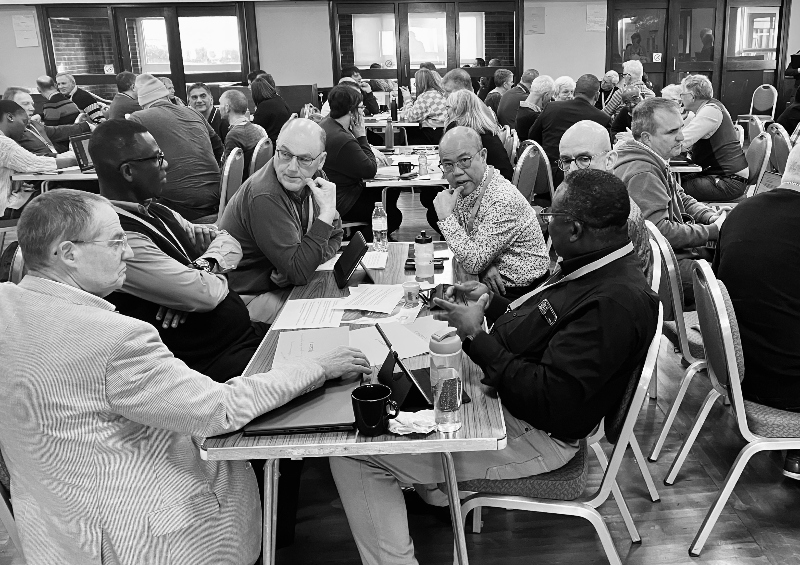
Ministerial Recognition Rules – notice of probable update
Council members were informed of a possible change to the Ministerial Rules, namely the publishing of the names of ministers who lose their accreditation for gross misconduct.
This item was brought to this Council for information, not decision. Any firm proposal will be brought to a future Council. Introducing it now gives the opportunity to comment and share feedback, members were told.
The item was brought by Ministries Team Co-Leaders Tim Fergusson and Lee Johnson. Neither could be onsite after testing positive for Covid, though Tim was able to present the section and answer questions via a Teams video link.
Their briefing paper explained why the change is being considered.
In September 2022, BUGB sought legal counsel regarding the Ministerial Recognition (MR) rules and the risk of challenge from Accredited Ministers whose accreditation is removed.
BUGB was advised it was appropriate to consider the publication of the names of Baptist ministers whose accreditation had been removed for gross misconduct or for safeguarding reasons. There is a societal expectation that ‘charitable bodies, including those in the faith sector, share information and are transparent about their processes regarding those who may pose an ongoing risk if placed again in a position of trust,’ the briefing paper stated.
Other professional accrediting bodies generally already publish the names of those dismissed for gross misconduct. This covers teachers, doctors, nurses, social workers and police. The Church of England also publishes names.
The Ministries Team, in consultation with the national Ministerial Recognition Committee, is now considering what criteria BUGB would use to determine:
-
which names would be published;
-
what exactly would be published;
-
and where it would be published.
The Team has already received advice that each decision to publish a name will need to be assessed individually.
‘We expect that in each case the need to protect the public from a particular minister’s practice would be weighed against the need to protect the privacy of complainants and victims of their behaviour,’ the briefing paper stated.
In addition, it is anticipated that publishing names will necessitate the likely introduction of a new category. This would cover behaviours listed ‘as examples of gross misconduct in the MR Rules that wider society would not necessarily deem to be unacceptable for a person in a position of trust, but are incompatible with being a Baptist minister.’ A minister losing their accreditation for ‘behaviour that is incompatible with being a Baptist minister’ as opposed to gross misconduct would be less disadvantaged when seeking new employment, according to the legal advice. The minister would be therefore less likely to make a claim against BUGB or their church.
BUGB would publish only the names of ministers whose behaviour is found to be gross misconduct – examples of which include domestic abuse, fraud and theft, grooming of others with a view to improper conduct, or harassment.
‘We are cognisant of the seriousness of such a change in policy and how ministers may react to this news,’ Tim and Lee stated in their briefing paper.
‘We wish to give space for views to be expressed.’
Anyone wishing to comment is invited to get in touch via the Ministries Team contact form
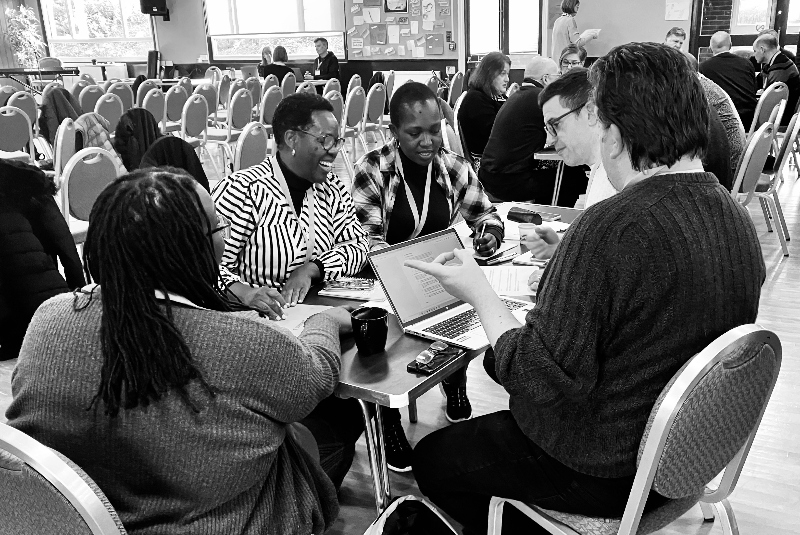
New member churches, church closures, amalgamations and more
Council members welcomed and prayed for one new church which has joined our Union. This was the Northstowe Church Network in Northstowe, a new town near Cambridge. (Eastern Baptist Association).
Northstowe is a local ecumenical partnership of the Church of England, the Baptist Union of Great Britain, and the United Reformed Church, working closely with the other Christian traditions involved in the Cambridgeshire Ecumenical Council. Its minister the Revd Dr Beth Cope prepared a short video to introduce the church and highlight its prayer requests, which includes bidding for new land on the development to create a 'house of prayer and hospitality'.
Council also welcomed the St Hild Centre for Baptist Ministry as a new member college. The last Council meeting saw members approve an in-principle decision to welcome the Centre, and thus give it the green light to start work on becoming a CIO (Charitable Incorporated Organisation). This had subsequently happened, and five months on it was now being formally welcomed into membership of the Baptist Union of Great Britain, the first new member college since the inception of the current Union. Read more here.
Council members were also informed of the following:
New Local Ecumenical Partnerships
Hugglescote Community Church (EMBA) - joining of Hugglescote Baptist and Methodist Churches
Amalgamations
Church closures
-
Trinity, Chesham
-
Bethel Baptist Church, Treharris
-
Zion Baptist Church, Blaenavon
-
Marks Gate Baptist Church
-
Coombe Bissett
-
Beckington Baptist Church
-
Borstal Baptist Church
-
Winton Baptist Church
-
Alton Baptist Church
-
Summerhill Baptist Church
-
Aldwincle Baptist Church
-
Deep Water Baptist Church (merged back with Coney Hill Baptist Church)
Churches ceasing membership of BUGB
-
Park Baptist Church (SWaBA)
-
Mundesley Baptist Church (EBA)
-
Little Mill Baptist Church (SWaBA)
Church Name Changes
-
Hope Baptist Church to Bethel House of God (NWBA)
-
The Vine Church to Dove River Church (EBA)
-
Andover Baptist Church to Andover Community Church (SCBA)
Council moderator Seidel Abel Boanerges led in prayer, saying, ‘There are lots of aspects of praise here, and sadness about the closures.
‘We pray that God will use all the churches – new and closing – to his glory. We rejoice and welcome new member churches and colleges.
‘We pray your mission will continue through the changes and amalgamations.’
Presidency 2025-2026
The role of Baptist Union President will be left vacant for 2025-2026, Council members confirmed.
They were told presidency nominations had been sought last autumn, but nothing had been received by the 31 December deadline.
The Core Leadership Team 'prayerfully considered the situation' and proposed a fallow year to Council for 2025-2026, a proposal supported by Trustees. The alternative was for Council to nominate a candidate.
Council members voted to support the proposal for a fallow year.
A question was posed about the plan moving forward.
In response, Lynn Green said, ‘We have a process that encourages participation. It will be down to all of us to work harder at sharing it.’
Current President Tim Presswood’s term ends at this year’s Baptist Assembly, when he will be succeeded by Steve Finamore. The fallow year follows Steve’s Presidency.
Key Roles Nominations
Council members voted to approve a series of commendations from the Key Roles Nominations Team relating to Baptist Union trustees, new and existing Council members, and the re-election of the moderator of Council itself, Seidel Abel Boanerges.
The trustees were the Revd Philip Lutterodt, Mr Mark Spriggs and the Revd Philip McCormack whose second term of three years ends on 31 August, and Peter King, who is coming to the end of his first term.
All four are willing to serve for a further term of three years. This is the final term of three years for Philip, Philip and Mark. Philip McCormack, Principal of Spurgeon’s College, represents College Principals on the Trustee Board.
Four co-options to Council were also re-elected. Council has up to 12 co-opted members, included specifically with the purpose of improving diversity, recognising the need for diversity of ethnicity, gender, disability, social class, age, rural/urban location, theological tradition and role in the life of the churches.
The Revds Gemma Duggan and Mark Hirst finish their second term of three years of this month, while the Revds Pamela Davies and Craig Millward are at the end of their first term. All were willing to serve for another term, and were duly re-elected.
Council members also voted to approve the nominations of three new people to serve as co-optees.
-
Miss Shua Yang – York Place Baptist Church, Swansea
-
Miss Bre McDermott-King – Battersea Chapel Baptist Church, London
-
The Revd Chris Goswami – Lymm Baptist Church, Warrington
Rupert said of Shua, ‘We think about our diversity. She's younger as well. I had a wonderful time chatting with her. I love who she's about and who I understand her to be, and what I believe she will bring to us. And it was the same with Bre.
‘Chris is fascinating in terms of his interest in technology - we liked what he'd bring to us.’
Moderator of Council - The Revd Dr Seidel Abel Boanerges was also re-elected to serve a second term of three years as Council moderator.
There remain some vacancies, Rupert told Council members. Specifically we still require a trustee with a high level of financial expertise.
In addition we continue to search for a successor to Rupert as moderator of the Key Roles Nominations Team.
‘We have had a number of interesting conversations,’ said Rupert. ‘All these things – we gather, put feelers out – you’re relying on that move of God’s Spirit that prompts someone to say yes.’
A question was asked about the diversity of the Key Roles Nominations Team, with Lynn currently being the only woman there. Rupert said he was trying to address this. ‘We have approached a number of people – we want to be fit for purpose and appropriate. It’s proving to be longer and harder – in much the same way it is for replacing me.’
‘In all these things friends, keep on thinking and praying,’ he added. ‘We need to use our minds and creativity.’
Rupert said the Team acknowledges with thanks the service of the Revd Osoba Otaigbe and Dion-Marie White as Council co-optees, and that the team was in conversation with someone to act as an advisor on the safeguarding sub-group, as per the last Council report.
Worship and Mission Forum films
The gathering was grounded in worship, scripture and prayer. Worship was led at various points by Nigel Manges, Carl Smethurst (both South West Baptist Association), Rachel Holland (Northern Baptist Association) and Ken Benjamin (former Baptist Union President and now with the London Institute for Contemporary Christianity). They were supported by Mark Hirst (South Eastern Baptist Association).
Several short films curated by Baptists Together Mission Forum were shown throughout the two days to remind Council members of the different ways God is working through our movement.
These included an update from Bread of Life ministry in Strood, Kent (SEBA), ministry and mission at Bonny Downs Baptist Church in east London, the opportunity for digital mission with Alice Cheeseman, and Everyone Everywhere, an exciting new national initiative to help ordinary Christians share Jesus (more details will be shared in the coming weeks).
All four videos can be viewed here.
Closing remarks
At the end of the gathering, moderator Seidel Abel Boanerges thanked Council members for their kind engagement over the two days.
‘I was very pleased with how you all contributed to the discussions and maintained respect, grace and love for one another,’ he said. ‘Despite the sensitive nature of the topic, you all engaged well.’
Baptist Times, 25/03/2024